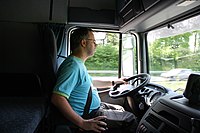
Photo from wikipedia
A dramatic increase in talking on the phone whilst driving has been seen over the past decades, which posed a significant safety threat on the whole society consequently. Studies on… Click to show full abstract
A dramatic increase in talking on the phone whilst driving has been seen over the past decades, which posed a significant safety threat on the whole society consequently. Studies on the topic regarding the effect of phone conversations on drivers’ driving performances have never come to a cease, especially on the studies of drivers’ brake response times. However, few studies focus on the relationship between situation criticality and the effect of cognitive load on drivers’ brake responses. To better understand it, a driving simulator experiment with two braking scenarios corresponding to two levels of situation criticality was conducted in this study. Participants were asked to follow a lead vehicle as they normally did and answer arithmetic problems (simple and complex) in three phone modes (baseline, hands-free, and handheld) in the meantime. Drivers’ brake response times to the lead vehicle under five conditions were collected and fitted in accumulator models, in which visual looming and brake lights onset were included as the sensory cues. Results demonstrated that the previously proposed mechanistically explicit simulation model was able to predict drivers’ brake response times on different levels of cognitive load and the increased effect of cognitive load on drivers’ brake response times in less critical situations was demonstrated in this paper as well.
Journal Title: Journal of Advanced Transportation
Year Published: 2020
Link to full text (if available)
Share on Social Media: Sign Up to like & get
recommendations!